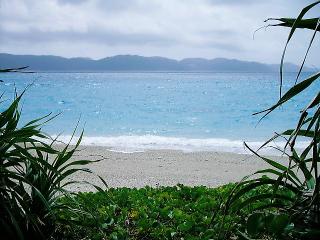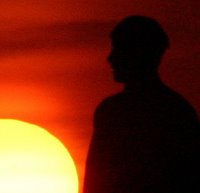Okinawa Part 3 (Zamami Hobo)
The only other inhabitant of the Zamami island campground, a sun-wrinkled old man who had been there a long time, was in the process of moving when we arrived, dragging his tent from a pine grove along the beach to the concrete terrace of an abandoned administrative building with a faded mural of a happy cartoon whale on its side.
“There’s a typhoon coming,” he said quietly by way of greeting, gesturing towards the tops of the pines. “Everyone left this morning. Boats won’t run today or tomorrow, maybe not until next week.”
“Feel the wind? Out of the south. This is the best spot here, sheltered. But there’s a nook in back of the building that’s not bad either. Still, your best bet is Robinson’s. In the village, 3000 yen for a room. ”
Tired of overblown amateur weather forecasts, I thanked the man for his advice but told him we would try our luck camping under the trees. With a shy smile and a little bow, he went back to his preparations for the coming storm.
After pitching the tent, pulling the rain-fly tight and snug, fastening clips to the poles and finally staking everything firmly into the sandy soil I walked down for a look at the beach. The campground was situated along the middle of a shallow bay spotted with wave-battered black outcrops and low-lying strips of sand. Tall bluffs sheltered the beach at both ends, blocking the view to the ferry terminal and, combining with the ring of islands to give the place a sense of placid isolation. Off in the direction of the village, a concrete pier marked the entrance to a harbor used by dive boats and sea kayakers, but apart from a dozing lifeguard, reptilian-like under his umbrella, the only other trace of civilization visible from the cove was a gazebo perched on top of the western bluff, built (along with an access road) for the exceptionally civilized purpose of viewing the sunset.
…………..
Last month, a friend visiting from New York gave me the paperback he read on the plane to Tokyo. The ideal airport book, a poorly written bestseller, it chronicled the adventures of American traders making millions in Japan during the frothy years of the bubble economy. The protagonists slogged through fifteen-hour days in front of computers “flogging the Nikkei Stock Exchange,” had their lives threatened in property disputes with yakuza squatters and spent what free time they had racing expensive motorcycles and sleeping with $5,000 hookers for an adrenaline rush that might begin to compensate for the stress of their jobs.
At the end of the book, its author listed off the rules by which the most successful trader managed his lifestyle. After the usual points about working harder than the next guy, taking advantage of greed and recognizing how risk can equate to opportunity, the trader’s final point was to “always remember, the only thing that matters at the end of the day is ending up on a beach with a bottle of champagne.”
The passage came to mind as I watched clouds forming on the southern horizon from that empty cove on Zamami Island and the old man from the campground brought a chair down to the waters edge, kicked off his plastic sandals and opened a can of Okinawan beer.
And I had to wonder…was it worth the stress, the screens, the alarm clocks to have champagne instead of beer, or beer instead of clean water? Why not cut out the slavish, amoral years of money grubbing and go straight to the beach?
Rolf Potts, the author of Vagabonding, a sort of inspirational guidebook for the lifestyle of extended travel, discusses a similar example from the movie Boiler Room, this time involving a Wall Street trader played by Ben Affleck who confesses his dream to make enough money to ride a motorcycle across China. As Rolf incredulously points out, Affleck’s character could make enough money to fulfill his dream by mowing lawns for a summer, with no need for three piece suits, power lunches and long, speed-fueled nights sniffing out arbitrage opportunities and market inefficiencies.
Market inefficiencies. Arbitrage. Finding something with an intrinsic worth that the other guy either doesn’t recognize or overvalues, then exploiting that imbalance for profit. Watching a sunset and drinking a glass of water while the traders sweat in their cubicles and go drive their fancy cars. Free time is the ultimate undervalued resource and money is its overvalued equivalent. Those truly using arbitrage to their advantage in this day and age are the heirs of Gary Snyder and John Muir, “the millions of young Americans wandering around with rucksacks, going up into the mountains to pray.”
…………..
I wanted to talk with the old man nursing his beer at the edge of the sea. Later, as the first rain showers quieted the dust and the lifeguard stashed his umbrella in a shed and slowly pedaled home, I joined him under the overhang, where he sat shirtless in front of his tent while a puppy tied to the leg of his chair enthusiastically dug holes in the sand.
“It’s raining,” I said, handing him a can of beer.
“And getting windy,” he answered, smiling softly and giving me a mosquito coil. Formalities completed, we sat back and watched the weather roll in.
“Are you from Okinawa?” I asked. A good part of Japanese conversations consists of questions with obvious answers.
“No,” he answered. “Do you know Tohoku? Sendai?”
I did. Sendai is a grimy, industrial town on the Pacific, the largest city in Northeast Japan, where homeless people sleep under the overpass in front of the train station.
“How long have you lived in the islands?”
“Eight months now,” he said after thinking for a moment. “Three weeks on Zamami so far. That little one keeps me company. I bought him on Ishigaki Island a few months back.”
The puppy was chewing on my finger with sharp little white teeth.
“See this?” He handed me a fishing pole, smiling nervously. “I eat sashimi all the time.”
He said it as if he needed to justify this life to me, to justify his empty campgrounds, dirty tent and slow-sipped cans of beer. I wanted to tell him that he didn’t have to justify anything but couldn’t find the words in Japanese and after a few more minutes I left to go watch the sunset.
It did rain that night, hard, and the wind shook the rain-fly against the sides of the tent. The next morning loudspeakers announced that all ferries were canceled, but the day after that one boat came in and we went home to Hokkaido, leaving the old man and his puppy alone at the campground.
“There’s a typhoon coming,” he said quietly by way of greeting, gesturing towards the tops of the pines. “Everyone left this morning. Boats won’t run today or tomorrow, maybe not until next week.”

“Feel the wind? Out of the south. This is the best spot here, sheltered. But there’s a nook in back of the building that’s not bad either. Still, your best bet is Robinson’s. In the village, 3000 yen for a room. ”
Tired of overblown amateur weather forecasts, I thanked the man for his advice but told him we would try our luck camping under the trees. With a shy smile and a little bow, he went back to his preparations for the coming storm.
After pitching the tent, pulling the rain-fly tight and snug, fastening clips to the poles and finally staking everything firmly into the sandy soil I walked down for a look at the beach. The campground was situated along the middle of a shallow bay spotted with wave-battered black outcrops and low-lying strips of sand. Tall bluffs sheltered the beach at both ends, blocking the view to the ferry terminal and, combining with the ring of islands to give the place a sense of placid isolation. Off in the direction of the village, a concrete pier marked the entrance to a harbor used by dive boats and sea kayakers, but apart from a dozing lifeguard, reptilian-like under his umbrella, the only other trace of civilization visible from the cove was a gazebo perched on top of the western bluff, built (along with an access road) for the exceptionally civilized purpose of viewing the sunset.
…………..
Last month, a friend visiting from New York gave me the paperback he read on the plane to Tokyo. The ideal airport book, a poorly written bestseller, it chronicled the adventures of American traders making millions in Japan during the frothy years of the bubble economy. The protagonists slogged through fifteen-hour days in front of computers “flogging the Nikkei Stock Exchange,” had their lives threatened in property disputes with yakuza squatters and spent what free time they had racing expensive motorcycles and sleeping with $5,000 hookers for an adrenaline rush that might begin to compensate for the stress of their jobs.
At the end of the book, its author listed off the rules by which the most successful trader managed his lifestyle. After the usual points about working harder than the next guy, taking advantage of greed and recognizing how risk can equate to opportunity, the trader’s final point was to “always remember, the only thing that matters at the end of the day is ending up on a beach with a bottle of champagne.”
The passage came to mind as I watched clouds forming on the southern horizon from that empty cove on Zamami Island and the old man from the campground brought a chair down to the waters edge, kicked off his plastic sandals and opened a can of Okinawan beer.
And I had to wonder…was it worth the stress, the screens, the alarm clocks to have champagne instead of beer, or beer instead of clean water? Why not cut out the slavish, amoral years of money grubbing and go straight to the beach?

Rolf Potts, the author of Vagabonding, a sort of inspirational guidebook for the lifestyle of extended travel, discusses a similar example from the movie Boiler Room, this time involving a Wall Street trader played by Ben Affleck who confesses his dream to make enough money to ride a motorcycle across China. As Rolf incredulously points out, Affleck’s character could make enough money to fulfill his dream by mowing lawns for a summer, with no need for three piece suits, power lunches and long, speed-fueled nights sniffing out arbitrage opportunities and market inefficiencies.
Market inefficiencies. Arbitrage. Finding something with an intrinsic worth that the other guy either doesn’t recognize or overvalues, then exploiting that imbalance for profit. Watching a sunset and drinking a glass of water while the traders sweat in their cubicles and go drive their fancy cars. Free time is the ultimate undervalued resource and money is its overvalued equivalent. Those truly using arbitrage to their advantage in this day and age are the heirs of Gary Snyder and John Muir, “the millions of young Americans wandering around with rucksacks, going up into the mountains to pray.”
…………..
I wanted to talk with the old man nursing his beer at the edge of the sea. Later, as the first rain showers quieted the dust and the lifeguard stashed his umbrella in a shed and slowly pedaled home, I joined him under the overhang, where he sat shirtless in front of his tent while a puppy tied to the leg of his chair enthusiastically dug holes in the sand.
“It’s raining,” I said, handing him a can of beer.
“And getting windy,” he answered, smiling softly and giving me a mosquito coil. Formalities completed, we sat back and watched the weather roll in.
“Are you from Okinawa?” I asked. A good part of Japanese conversations consists of questions with obvious answers.
“No,” he answered. “Do you know Tohoku? Sendai?”
I did. Sendai is a grimy, industrial town on the Pacific, the largest city in Northeast Japan, where homeless people sleep under the overpass in front of the train station.
“How long have you lived in the islands?”
“Eight months now,” he said after thinking for a moment. “Three weeks on Zamami so far. That little one keeps me company. I bought him on Ishigaki Island a few months back.”
The puppy was chewing on my finger with sharp little white teeth.
“See this?” He handed me a fishing pole, smiling nervously. “I eat sashimi all the time.”
He said it as if he needed to justify this life to me, to justify his empty campgrounds, dirty tent and slow-sipped cans of beer. I wanted to tell him that he didn’t have to justify anything but couldn’t find the words in Japanese and after a few more minutes I left to go watch the sunset.
It did rain that night, hard, and the wind shook the rain-fly against the sides of the tent. The next morning loudspeakers announced that all ferries were canceled, but the day after that one boat came in and we went home to Hokkaido, leaving the old man and his puppy alone at the campground.



